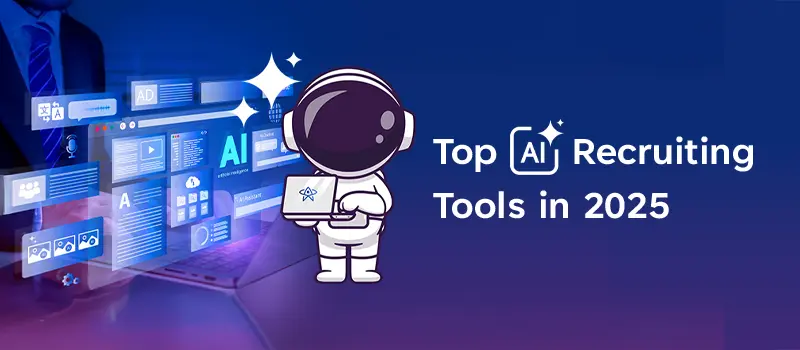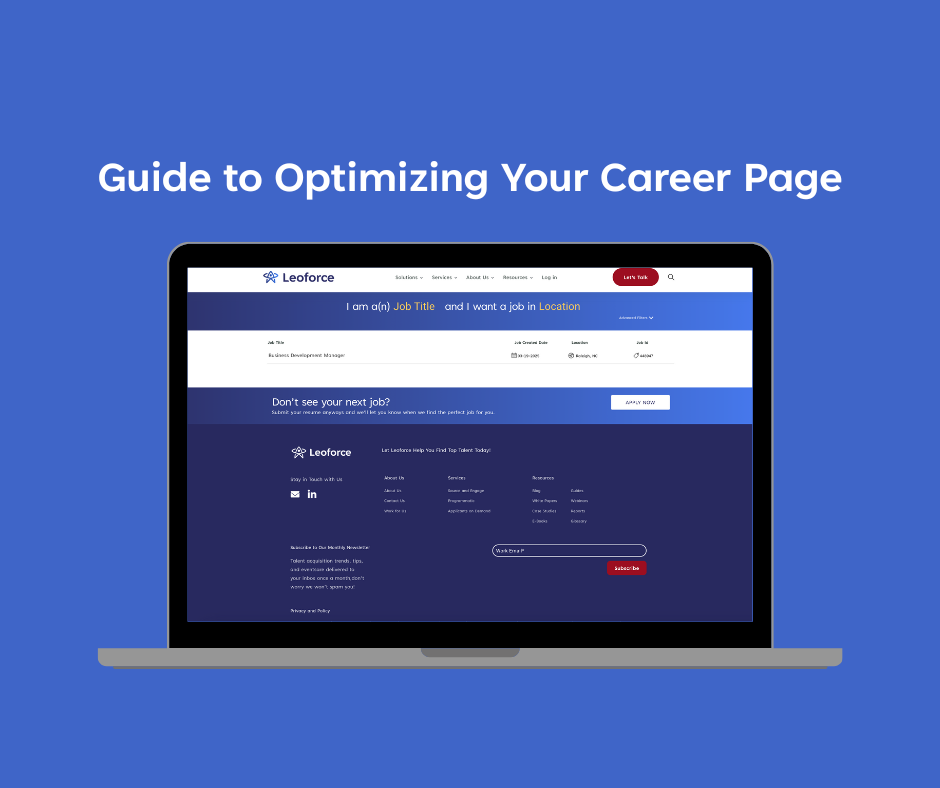Five urgent challenges and solutions for bulk healthcare hiring

Recruiting for the healthcare industry has been a roller coaster lately. U.S. BLS[1] predicts that healthcare employment is set to grow at 13% from 2021 to 2031; much faster than the average for all occupations. Notably, the effects of covid-19 on healthcare recruitment were unlike other sectors – It dropped drastically in early 2020 but rebounded at nearly 95% of pre-pandemic job numbers by July 2020[2] because of unprecedented demands. Further, trends like healthcare services spread into the communities, baby boomers touching the age of 65 by 2030[3], and the shortage of seats in nursing schools[4] contribute to the tricky task of maintaining supply and demand for healthcare recruiters.
Fortunately, medical staffing solutions are transitioning towards more digital-driven, agile, and leaner operational models. Which could mean new ways around the unique challenges of healthcare recruiting. And these are what we discuss in this article. We’ll also discuss the latest tools for medical staffing solutions (the ones powered by AI) and, in the end, answer some of the most critical questions of healthcare hiring in the US today.
Before we dive deeper, let’s just formally clarify healthcare hiring.
What is healthcare hiring?
Healthcare hiring refers to identifying the staffing needs of healthcare organizations and driving the recruitment process for their vacancies. This covers a wide range of roles in the healthcare industry, such as doctors, nurses, medical assistants, technicians, administrative staff, and more at all seniority levels.
As we mentioned earlier, recruiting for healthcare has seen a rapid change in supply and demand, and health, in general, being a sensitive topic among individuals, it comes with its distinct challenges of balancing the act of quantity and quality of healthcare professionals.
Below we discuss those pertinent points of interest for medical staffing agencies and discern how data and technology help alleviate the situation.
Pressing challenges in bulk healthcare recruitment
-
Higher burnout and attrition
Although we look at COVID-19 in the back mirror, its effects still linger. During 2020 – 2022, it scaled up burnout levels immensely throughout the entire healthcare industry, from nursing and critical care staff to physicians, hospital administrators, and more. At the same time, this led to higher attrition levels due to increasing fatigue and poor work-life balance.
Employee satisfaction and staff retention have thus become critical objectives for medical staffing agencies.
-
Talent shortages
With large-scale attrition affecting the sector, there are severe worker shortages across medical facilities, leading to crucial gaps in timely care and service delivery. Per an Association of American Medical Colleges[5] survey, the US could face a physician shortage ranging upto 94,700 by 2025. Concerning nurses, there is also a trend of shifting from semi-urban/rural areas to urban healthcare centers as they offer higher nurses salaries; in turn, leading to thinning of qualified nurses in their smaller towns.
Many healthcare providers thus rely on temporary healthcare hiring solutions to fill the void. However, given the nature of the job, it tends to create a more volatile medical staffing environment – temporarily easing the challenges without tackling the problem head-on.
-
Digital shifts
The healthcare industry is witnessing a critical shift towards digitized solutions, where telehealth and remote care services are in high demand. But finding skilled and qualified talent to deal with the same is quite a task. It may also require some medical staffing agencies to adopt software or apps to support their clients, which come with their own complications of training, maintenance, and awareness.
-
Administrative bottlenecks
Administrative lags continue to plague the sector, particularly with rising demand. Overheads for medical talent acquisition teams are hitting the roof already. Their duties include verifications, screening, background checks, credential assessment, licensing, and more. The pandemic had only compounded the problem with inevitable work-from-home or hybrid policies.
-
Rising costs
Every medical staffing agency and recruiting team is dealing with escalating costs of skilled personnel, especially for temporary solutions. It’s eating into their margins in the long haul. Plus, the prospect of a global recession is only putting more pressure on businesses to cut corners.
Practical solutions to challenges of medical staffing
As much as we try to forget it, the most critical of the medical staffing challenges stem from COVID-19. Thankfully, businesses worldwide are acting up on this opportunity to reinvent the medical staffing procedure by implementing tech and techniques that were long pending even before the pandemic.
-
Adoption of economic tools
Healthcare providers need to ferret out effective and affordable recruitment partnerships and tools for meeting the increased requirements in the past couple of years.
An AI-powered medical recruitment tool can be active round the clock and speed up the process at each step while also adapting to budget restraints.
-
Hiring accuracy
Companies need to zero in on solutions that put forward the best candidates for specific jobs or positions without compromising accuracy, credentials, and location-based needs. Also, with the rising trend to have a more diverse workforce, it is critical to widen and diversify the talent pool.
Suggested reading on DEI Hiring: Blueprint to drive DEI hiring in the workplace
-
Automated assessment
While aiming at bulk healthcare hiring, medical staffing agency would have to assess the thick volume of candidates post-CV-sorting. Having accurate screening tools that automate this administrative process could be a potential solution for a fast and efficient assessment without the direct involvement of your recruitment workforce.
AI hiring tools like Leoforce by Leoforce can also rank the resume on customizable metrics making it easier to prioritize the order of manual intervention.
-
Lowering costs
Reducing hiring costs is one of the biggest challenges for medical staffing agencies. It is possible with technology-driven solutions that simplify the hiring procedure, aligning seamlessly with existing hospital networks and systems, thereby reducing expenditure by a sizable margin.
-
Reducing hiring timelines
With the shortage of skilled staff and skyrocketing demand putting pressure on healthcare providers, the immediate need is to find an efficient hiring solution. Preferably one that shortens the hiring timeline through faster integration with systems, bigger candidate pools, swifter verification and screening, and hassle-free onboarding.
There you go with the most practical solutions that every medical staffing agency can consider for addressing ongoing and future challenges of healthcare recruiting head-on. Basically, the industry should embrace technology and digitization to simplify and ease bulk recruitment procedures. It will also allow for fostering an active and sizable talent pool that remains within reach as required.
How to find the best tool for healthcare hiring
Several tech-driven tools rely on strategic automation and engagement to deliver the best results for clients. It is a field already witnessing immense traction, not just in the healthcare recruiting segment but in others as well. So, with a plethora of hiring tools available to medical staffing agencies, it becomes important to find the right tool right away or bleed out both time and money.
You can consider the following factors to choose a medical staffing solution:
- Fully customizable at each step of recruitment, including sourcing, shortlisting, engagement, and selection
- Access to a great number of medical professionals across a diverse spectrum of roles: PTA, OTA, and NP.
- Seamlessly integrates with the applicant tracking systems (ATS) of large-scale hospital networks.
- Capable of retargeting existing talent pools with external/internal recruitment and passive providers.
- Automatically review pipelines and resumes with an easy-to-use dashboard while automating candidate engagement.
Over to you
The challenges of healthcare hiring are manifold, but the solutions to these issues are readily available. But as you navigate the complex world of healthcare recruitment, it’s important to consider all your options and choose the best tool for your organization’s needs. Look for a medical staffing solutions provider that offers a range of services, including automated assessment and the adoption of economic tools.
One such solution is the use of AI-powered hiring tools, which can help identify top candidates and eliminate administrative bottlenecks. These tools offer a wealth of benefits, including lower costs, faster hiring timelines, and increased accuracy. Leoforce Quantum by Leoforce is a tool that comes equipped with these salient features, including access to over 850 million candidates, talent sourcing across 50+ channels, and built-in diversity hiring options.
Request a Demo today to check how it can increase your medical hiring quality while setting you up for faster hires and lower costs.
FAQs
Is medical staffing solutions legit?
Yes, medical staffing solutions are legitimate services that connect healthcare employers with qualified candidates for staffing needs.
What does recruiting mean in healthcare?
In healthcare, recruiting refers to the process of identifying and attracting qualified candidates for open positions within medical facilities or organizations.
What makes a great healthcare recruiter?
A great healthcare recruiter possesses knowledge of healthcare industry trends and regulations, strong communication skills, and a network of industry contacts.
What skills do you need to be a healthcare recruiter?
Essential skills for a healthcare recruiter include relationship building, organization, attention to detail, and the ability to communicate effectively with both candidates and employers.
Is a healthcare recruiter a stressful job?
Yes, healthcare recruiting can be a stressful job due to the high stakes involved in finding qualified candidates for critical roles, tight timelines, and competition for top talent.
References
[1] https://www.bls.gov/ooh/healthcare/home.htm
[2] https://www.healthsystemtracker.org/chart-collection/what-impact-has-the-coronavirus-pandemic-had-on-healthcare-employment
[3] https://www.forbes.com/sites/qai/2022/12/11/more-aging-baby-boomers-are-living-alone—how-do-they-compare-with-previous-generations/?sh=68c75ea23ad2
[4] https://calmatters.org/education/higher-education/college-beat-higher-education/2023/03/california-nursing-school/
[5] https://www.peoplescout.com/insights/healthcare-talent-generational-divide/





